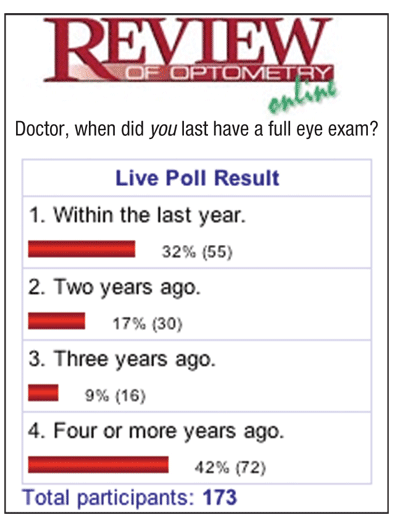 Q: Doctor, when did you last have an eye exam?
Q: Doctor, when did you last have an eye exam?
A: If youre like most optometrists, its been too long since you yourself had a comprehensive eye examination. Ive been in practice for 27 years, and I think Ive examined four optometrists in all that time, says Robert Pinkert, O.D., medical director of
Indeed, according to Review of Optometry Onlines latest Live Poll, as many as one-half (51%) of all respondents have not had a full eye exam in three or more years. Only one in three O.D.s (32%) have had an exam in the last year.
Its less than sincere to ask our patients to do what we do not do ourselvesto have regular eye and vision examinations every one to two years, says R. Norman Bailey, M.A., O.D., M.B.A., M.P.H., clinical professor at the University of Houston College of Optometry. It reminds me of the doctor who advises his patients to stop smoking while still smoking himself.
The eyes of optometrists are no different than those of their patients, Dr. Bailey says, and require the same level of attention. For his part, Dr. Bailey had his eyes examined less than a year ago.
 I have always heard that healthcare practitioners are the worst at taking care of their own health, he says. It seems this is no exception for optometrists.
I have always heard that healthcare practitioners are the worst at taking care of their own health, he says. It seems this is no exception for optometrists.
Little or no research has been done on the subject of eye doctors own level of eye care. In comparison, however, research does indicate that physicians dont practice what they preach when it comes to taking care of their own health.
One study from the
In particular, GPs held a double standard if their symptoms were for a stigmatized problem (such as depression). When their symptoms are not for a stigmatized problem, GPs are more willing to cross the boundary and consider themselves as patients.
Still, this behavior doesnt quite concur with routine eye care. Getting an eye exam is not controversial. So, why dont O.D.s cross the boundary and become patients for regular eye exams?
The problem is that O.D.s do think just like their patients, says Dr. Pinkert. Like anyone else, we put things off.
Compare the results of the Live Poll to the frequency of eye exams for the average American: Fewer than half (46%) of Americans say they get an annual eye exam, according to a new poll by Harris Interactive for Lighthouse International.
Just like their patients, optometrists often accept the bare minimum of eye care, Dr. Pinkert says. Theyll refract themselves and occasionally have one of their techs do puff tonometry, but wont go to another eye doctor until symptoms arise. Unfortunately, some asymptomatic conditions such as glaucoma can become problematic, whether youre an O.D. or not, Dr. Pinkert says.
Most optometrists would be happy to provide an eye exam to a colleague out of professional courtesy, Dr. Pinkert suggests. If youre one of the majority who hasnt had a recent comprehensive exam, go ahead and take them up on it. Dont neglect to practice what you preach.
1.

